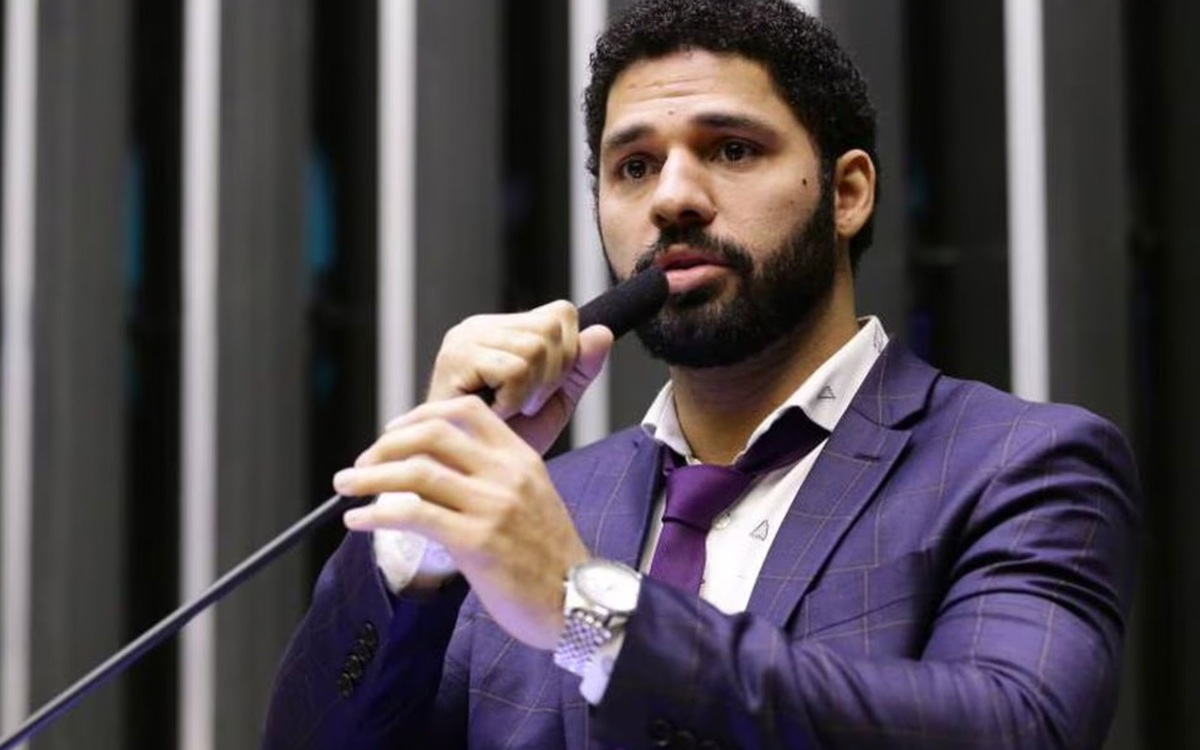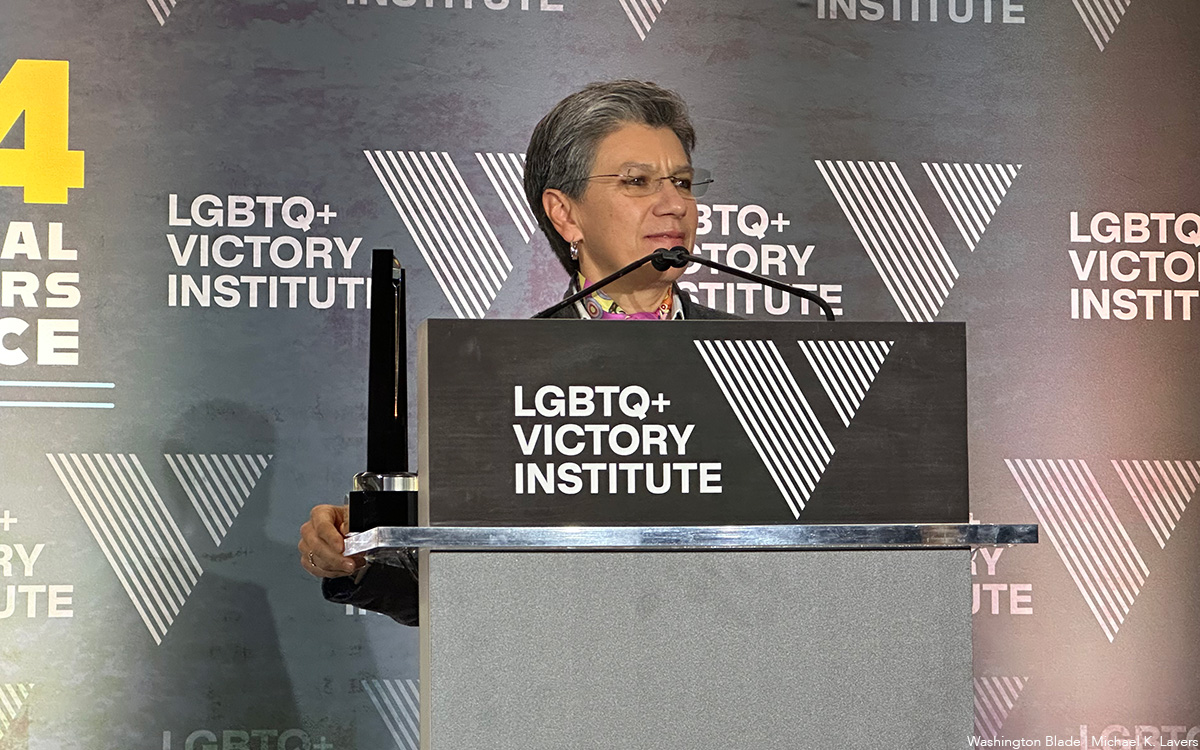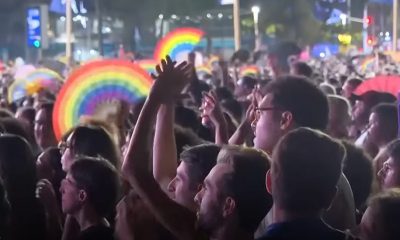South America
Former Brazilian congressman David Miranda dies at 37
Glenn Greenwald announced husband’s death on Tuesday

Former Brazilian Congressman David Miranda died in a Rio de Janeiro hospital on Tuesday.
Media reports indicate Miranda, 37, had been in the intensive care unit for nine months with a gastrointestinal infection. His husband, journalist Glenn Greenwald, announced Miranda’s death on his Twitter page.
“His death, early this morning, came after a 9-month battle in ICU,” tweeted Greenwald. “He died in full peace, surrounded by our children and family and friends.”
It is with the most profound sadness that I announce the passing away of my husband, @DavidMirandaRio. He would have turned 38 tomorrow.
His death, early this morning, came after a 9-month battle in ICU. He died in full peace, surrounded by our children and family and friends. pic.twitter.com/wtRvGyJyGl
— Glenn Greenwald (@ggreenwald) May 9, 2023
Miranda, who would have turned 38 on Wednesday, was born in Rio’s Jacarezinho favela.
Greenwald on his Twitter account noted Miranda’s neighbor adopted him after his mother died when he was 5.
“That gave David the chance to live his full potential in a society that often suffocates it,” said Greenwald. “He was key to the (Edward) Snowden story, became the first gay man elected to Rio’s City Council, then federal Congress at 32. He inspired so many with his biography, passion and force of life.”
That gave David the chance to live his full potential in a society that often suffocates it. He was key to the Snowden story, became the first gay man elected to Rio’s City Council, then federal Congress at 32. He inspired so many with his biography, passion, and force of life. pic.twitter.com/i84GWmJrbI
— Glenn Greenwald (@ggreenwald) May 9, 2023
Miranda and Greenwald met on a Rio beach in 2005. The two men in 2017 adopted two brothers.
Miranda in 2016 won a seat on the Rio Muncipal Council. His friend, bisexual Rio Municipal Councilwoman Marielle Franco and her driver, Anderson Gomes, were assassinated on March 14, 2018, in the city’s Lapa neighborhood.
Miranda in 2019 succeeded Jean Wyllys, who is openly gay, after death threats prompted him to resign from Congress and flee Brazil. Miranda last year announced he would not seek re-election.
“My condolences to Glenn Greenwald and relatives for the loss of David Miranda,” tweeted Brazilian President Luiz Inácio Lula da Silva. “[He was] a young man with an extraordinary trajectory who left too soon.”
Michelle Seixas, the national political coordinator of Articulação Brasileira de Lésbicas (Brazilian Articulation of Lesbians), a group that advocates on behalf of lesbians in Brazil, told the Washington Blade that Miranda’s death is “still hard to believe.” Other Brazilian activists, advocacy groups and politicians also mourned the late-congressman.
“I just received the sad news of the death of colleague David Miranda, a former federal congressman for the PSOL (Socialism and Liberty Party) and LGBT activist,” said Congresswoman Erika Hilton, a transgender woman who represents São Paulo. “My love and solidarity with your family and friends. Rest in peace, David!”
Acabo de receber a triste notícia do falecimento do colega David Miranda, ex Deputado Federal pelo PSOL e ativista LGBT. Meu abraço e solidariedade à seus familiares e amigos. Descanse em paz, David!
— ERIKA HILTON (@ErikakHilton) May 9, 2023
Franco’s widow, Rio Municipal Councilwoman Mônica Benício, also paid tribute to Miranda.
“David Miranda — one of the greatest loves I’ve ever had in my life,” said Benício in a tweet that included a picture of her kissing Miranda. “We were so obsessed with each other that we made a promise to die together one day because we didn’t want to live without our friendship, but David couldn’t wait. He leaves us on the eve of his birthday.”
David Miranda – um dos maiores amores que eu já tive na vida. Éramos tão obcecados um pelo outro que fizemos uma promessa de morremos juntos um dia porque não queríamos viver sem a nossa amizade. Mas David não conseguiu esperar. Ele nos deixa às véspera de seu aniversário. ➕ pic.twitter.com/X6dGCpCaw1
— Monica Benicio (@monica_benicio) May 9, 2023
Gui Mohallem, co-founder and director of VoteLGBT, a group that seeks to increase the number of LGBTQ and intersex people in Brazilian politics, also mourned Miranda.
“It’s a great, great, great loss,” Mohallem told the Blade on Tuesday.
Colombia
Colombia avanza hacia la igualdad para personas trans
Fue aprobado en Comisión Primera de la Cámara la Ley Integral Trans

En un hecho histórico para los derechos humanos en Colombia, la Comisión Primera de la Cámara de Representantes aprobó en primer debate el Proyecto de Ley 122 de 2024, conocido como la Ley Integral Trans, que busca garantizar la igualdad efectiva de las personas con identidades de género diversas en el país. Esta iniciativa, impulsada por más de cien organizaciones sociales defensoras de los derechos LGBTQ, congresistas de la comisión por la Diversidad y personas trans, representa un paso decisivo hacia el reconocimiento pleno de derechos para esta población históricamente marginada.
La Ley Integral Trans propone un marco normativo robusto para enfrentar la discriminación y promover la inclusión. Entre sus principales ejes se destacan el acceso a servicios de salud con enfoque diferencial, el reconocimiento de la identidad de género en todos los ámbitos de la vida, la creación de programas de empleo y educación para personas trans, así como medidas para garantizar el acceso a la justicia y la protección frente a violencias basadas en prejuicios.
Detractores hablan de ‘imposición ideológica
Sin embargo, el avance del proyecto no ha estado exento de polémicas. Algunos sectores conservadores han señalado que la iniciativa representa una “imposición ideológica”. La senadora y precandidata presidencial María Fernanda Cabal anunció públicamente que se opondrá al proyecto de Ley Integral Trans cuando llegue al Senado, argumentando que “todas las personas deben ser tratadas por igual” y que esta propuesta vulneraría un principio constitucional. Estas declaraciones anticipan un debate intenso en las próximas etapas legislativas.
El proyecto también establecelineamientos claros para que las instituciones públicas respeten el nombre y el género con los que las personas trans se identifican, en concordancia con su identidad de género, y contempla procesos de formación y sensibilización en entidades estatales. Además, impulsa políticas públicas en contextos clave como el trabajo, la educación, la cultura y el deporte, promoviendo una vida libre de discriminación y con garantías plenas de participación.
¿Qué sigue para que sea ley?
La Ley aún debe superar varios debates legislativos, incluyendo la plenaria en la Cámara y luego el paso al Senado; pero la sola aprobación en Comisión Primera ya constituye un hito en la lucha por la igualdad y la dignidad de las personas trans en Colombia. En un país donde esta población enfrenta altos niveles de exclusión, violencia y barreras estructurales, este avance legislativo renueva la esperanza de una transformación real.
Desde www.orgullolgbt.co, celebramos este logro, invitamos a unirnos en esta causa impulsándola en los círculos a los que tengamos acceso y reiteramos nuestro compromiso con la visibilidad, los derechos y la vida digna de las personas trans. La #LeyIntegralTrans bautizada “Ley Sara Millerey” en honor de la mujer trans recientemente asesinada en Bello, Antioquia (ver más aquí); no es solo una propuesta normativa: es un acto de justicia que busca asegurar condiciones reales para que todas las personas puedan vivir con libertad, seguridad y respeto por su identidad.
Colombia
Claudia López running for president of Colombia
Former Bogotá mayor married to Sen. Angélica Lozano

Former Bogotá Mayor Claudia López has announced she is running for president of Colombia.
“We begin today and we will win in a year,” she said in a social media post on June 3.
View this post on Instagram
López, 55, was a student protest movement leader, journalist, and political scientist before she entered politics. López returned to Colombia in 2013 after she earned her PhD in political science at Columbia University.
López in a speech she gave last December after the LGBTQ+ Victory Institute honored her at its annual International LGBTQ Leaders Conference in D.C. noted Juan Francisco “Kiko” Gomez, a former governor of La Guajíra, a department in northern Colombia, threatened to assassinate her because she wrote about his ties to criminal gangs.
A Bogotá judge in 2017 convicted Gómez of ordering members of a paramilitary group to kill former Barrancas Mayor Yandra Brito, her husband, and bodyguard and sentenced him to 55 years in prison.
López in 2014 returned to Colombia, and ran for the country’s Senate as a member of the center-left Green Alliance party after she recovered from breast cancer. López won after a 10-week campaign that cost $80,000.
López in 2018 was her party’s candidate to succeed then-President Juan Manuel Santos when he left office. López in 2019 became the first woman and first lesbian elected mayor of Bogotá, the Colombian capital and the country’s largest city.
López took office on Jan. 1, 2020, less than a month after she married her wife, Colombian Sen. Angélica Lozano. (López was not out when she was elected to the Senate.) López’s mayorship ended on Dec. 31, 2023. She was a 2024 Harvard University Advance Leadership Initiative fellow.
The first-round of Colombia’s presidential election will take place on May 31, 2026.
The country’s 1991 constitution prevents current President Gustavo Petro from seeking re-election.
López declared her candidacy four days before a gunman shot Sen. Miguel Uribe, a member of the opposition Democratic Center party who is seen as a probable presidential candidate, in the head during a rally in Bogotá’s Fontibón neighborhood.
She quickly condemned the shooting. López during an interview with the Washington Blade after the Victory Institute honored her called for an end to polarization in Colombia.
“We need to listen to each other again, we need to have a coffee with each other again, we need to touch each other’s skin,” she said.
López would be Colombia’s first female president if she wins. López would also become the third openly lesbian woman elected head of government — Jóhanna Sigurðardóttir was Iceland’s prime minister from 2009-2013 and Ana Brnabić was Serbia’s prime minister from 2017-2024.
Chile
Gay pharmacist’s murder sparks outrage in Chile
Francisco Albornoz’s body found in remote ravine on June 4

The latest revelations about the tragic death of Francisco Albornoz, a 21-year-old gay pharmacist whose body was found on June 4 in a remote ravine in the O’Higgins region 12 days after he disappeared, has left Chile’s LGBTQ community shocked.
The crime, which was initially surrounded by uncertainty and contradictory theories, has taken a darker and more shocking turn after prosecutors charged Christian González, an Ecuadorian doctor, and José Miguel Baeza, a Chilean chef, in connection with Albornoz’s murder. González and Baeza are in custody while authorities continue to investigate the case.
The Chilean Public Prosecutor’s Office has pointed to a premeditated “criminal plan” to murder Albornoz.
Rossana Folli, the prosecutor who is in charge of the case, says Albornoz died as a a result of traumatic encephalopathy after receiving multiple blows to the head inside an apartment in Ñuñoa, which is just outside of Santiago, the Chilean capital, early on May 24. The Prosecutor’s Office has categorically ruled out that Albornoz died of a drug overdose, as initial reports suggested.
“The fact that motivates and leads to the unfortunate death of Francisco is part of a criminal plan of the two defendants, aimed at ensuring his death and guaranteeing total impunity,” Folli told the court. “The seriousness of the facts led the judge to decree preventive detention for both defendants on the grounds that their freedom represents a danger to public safety.”
Prosecutors during a June 7 hearing that lasted almost eight hours presented conservations from the suspects’ cell phones that they say showed they planned the murder in advance.
“Here we already have one (for Albornoz.) If you bring chloroform, drugs, marijuana, etc.,” read one of the messages.
Security cameras captured the three men entering the apartment where the murder took place together.
Hours later, one of the suspects left with a suitcase and a shopping cart to transport Albornoz’s body, which had been wrapped in a sleeping bag. The route they followed to dispose of the body included a stop to buy drinks, potato chips, gloves, and a rope with which they finally descended a ravine to hide it.
Advocacy groups demand authorities investigate murder as hate crime
Although the Public Prosecutor’s Office has not yet officially classified the murder as a hate crime, LGBTQ organizations are already demanding authorities investigate this angle. Human rights groups have raised concerns over patterns of violence that affect queer people in Chile.
The Zamudio Law and other anti-discrimination laws exist. Activists, however, maintain crimes motivated by a person’s sexual orientation or gender identity are not properly prosecuted.
“This is not just a homicide, it is the cruelest expression of a society that still allows the dehumanization of LGBTQ+ people,” said a statement from Fundación Iguales, one of Chile’s main LGBTQ organizations. “We demand truth, justice, and guarantees of non-repetition.”
The Movement for Homosexual Integration and Liberation (Movilh), meanwhile, indicated that “since the first day the family contacted us, we have been in conversations with the Prosecutor’s Office so that this fatal outcome is thoroughly investigated, including the possible existence of homophobic motivations or components.”
The investigation into Albornoz’s murder continues, and the court has imposed a 90-day deadline for authorities to complete it.
-

 U.S. Supreme Court5 days ago
U.S. Supreme Court5 days agoSupreme Court upholds ACA rule that makes PrEP, other preventative care free
-

 U.S. Supreme Court5 days ago
U.S. Supreme Court5 days agoSupreme Court rules parents must have option to opt children out of LGBTQ-specific lessons
-

 Television5 days ago
Television5 days ago‘White Lotus,’ ‘Severance,’ ‘Andor’ lead Dorian TV Awards noms
-

 Music & Concerts5 days ago
Music & Concerts5 days agoBerkshire Choral to commemorate Matthew Shepard’s life











